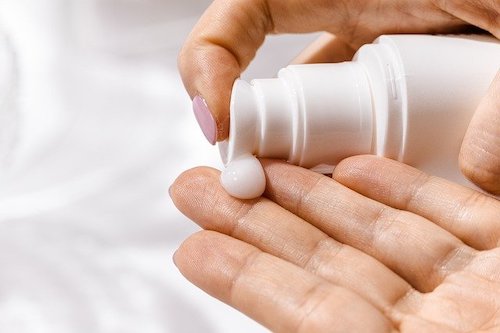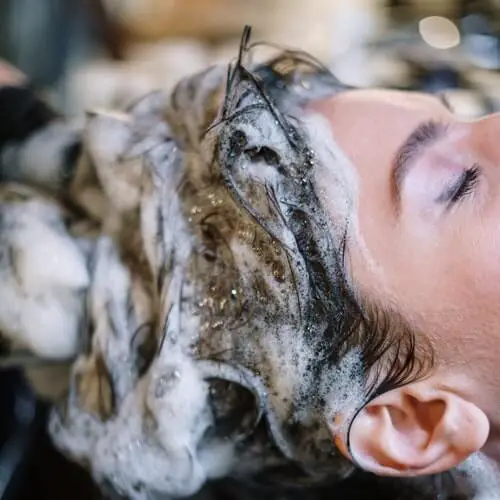Apple pectin shampoo is a hair care product that has apple pectin as the main ingredient. Apple pectin is commonly extracted from the fruit and used in shampoos, bath soaps, and other beauty products because it binds well with water to form gels.
It gives these products (like this Zotos fortifying shampoo) an opaque look, improves their viscosity (thickness), often helps them feel better on the skin or scalp, and typically enhances their lathering ability (ability to make bubbles) when mixed with soap or detergents like sodium lauryl sulfate.
Apple pectin acts similarly to guar gum, which is another popular thickening agent for cosmetics; however, guar gum isn’t always suitable for use in shampoos because it is easily broken apart by the chemicals in hard water.
Apple pectin is nearly four times as thick as guar gum when it comes into contact with water, which makes it a good choice for shampoos.
In addition to its use in shampoo, apple pectin has been used externally to treat skin irritations and has been investigated as a treatment for constipation, although more studies are needed before any kind of health claim can be made for this product.

The composition of apple pectin varies depending on what type of fruit was used to extract it. Some apples may contain larger amounts of certain sugars or have a higher pH than others do, so these factors also affect the quality of the product that’s made with apple pectin.
As its name implies, the primary ingredient in most apple pectin shampoos is pectin. These products are often marketed as “natural” or “organic,” but they do not contain whole fruits and may be no better than mainstream alternatives that contain chemicals like sodium lauryl sulfate.
Apple pectin became more popularly used in shampoos and other beauty products in the United States, in the early 1960s and 70s. Production has since dwindled, while also staying popular in many other parts of the world.
Who Would Use Apple Pectin Shampoo
Apple pectin shampoo can be used by people who have dry skin or dandruff to improve their condition. It has a sweet smell because it contains artificial ingredients, but natural scents can also be added to give it a more pleasant scent.
Shampoo typically comes in liquid form and is used to wash through strands of the hair. It is then rinsed out of the hair after a few minutes or left on for a few minutes more before being washed out. Some types of shampoo, however, may be left on the hair for a longer period to help condition it and reduce dandruff.
Apple pectin is a thickener that’s often used in shampoos as well as other cosmetics to improve how they feel when the user rubs the product across their skin.
It can increase a product’s viscosity, or thickness, by as much as 100 times its original weight.
In fact, apple pectin is so effective at keeping liquid from seeping through its mass that it’s been used during oil spills to keep water from flowing through patches of oil-covered land.
How Apple Pectin Shampoo Works
In order for apple pectin to be absorbed into the hair and skin, it needs to absorb water first. When apple pectin comes into contact with liquid, it absorbs many times its own weight in that liquid. The outside of individual apple pectin molecules is hydrophilic (water-loving) while their cores are hydrophobic (water-repelling)
This allows them to attract liquid in much the same way that iron filings seek out a magnet by clustering around its poles.

Once they have absorbed liquid, these molecules swell up so much that they push against each other and create a thick gel-like texture, which traps liquid within its matrix rather than letting it seep through. This property makes them very useful for stabilizing many types of cosmetics, such as shampoos and face masks.
Apple pectin molecules are able to absorb so much liquid because they have a branched structure that allows them to group together very easily if there is enough water around. This makes it easy for even small amounts of apple pectin in a shampoo or other product to form a thick gel when combined with water.
The size and shape of apple pectin molecules also affect their properties. Unlike some other thickeners used in shampoos, the outside of an individual apple pectin molecule has many chains attached to it.
These can interact with each other by forming hydrogen bonds, which hold their surfaces together. The number and strength of these bonds vary from one apple pectin molecule to another, which means that different brands of apple pectin have different properties.
Who makes Apple Pectin Shampoo
Apple pectin has many benefits for the hair, including adding shine, softness, and body. So while some shampoos contain apple pectin as an ingredient, who makes these apple pectin shampoos?

Many companies have begun to use apple pectin as a primary ingredient in their shampoos, though they may list it as a secondary ingredient after water on the label.
Some of these products are made by long-standing beauty product companies (like Zotos), while others are made by smaller manufacturing companies
How effective is Apple pectin shampoo?
Apple pectin’s ability to make hair shiny and soft has been well documented. It has also been shown to help reduce dandruff.
In one study, people with dandruff who used an apple pectin shampoo had more than two times fewer dead skin cells per square inch of the scalp compared to those who used a regular medicated shampoo that contained zinc pyrithione.
In addition to its ability to prevent water from seeping through it, this thickening action helps keep hair follicles closed.
This helps stop hair loss that may be caused by a buildup of dirt on the scalp due to the opening of these follicles.
Final Thoughts
Apple pectin is an effective shampoo ingredient, that may be used alone, or combined with other ingredients such as salt, certain proteins, and amino acids.
It is also worth noting that apple pectin isn’t found in every hair care product and its effects aren’t guaranteed to work for everyone.
So while it does have many benefits for hair and skin, you should beware of misleading labeling that promises too much.

